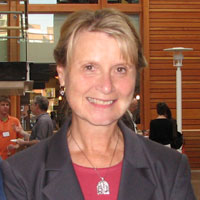Researchers propose action plan to improve quality health services for nations facing ‘extreme adversity’
August 5, 2019
In order to help the World Health Organization (WHO) meet its goal of better protecting one billion people from health emergencies by 2023, a team of researchers from the UNC Gillings School of Global Public Health has proposed an evidence-based framework to improve the quality of health services in areas facing extreme adversity.

Sheila Leatherman
Sheila Leatherman, MSW, professor of health policy and management at the Gillings School, is lead author of the paper “Commentary: Quality Health Care in Extreme Adversity—an Action Framework,” which was published in collaboration with WHO July 11 in the International Journal for Quality in Health Care.
According to the paper, two billion people worldwide live in countries where development is negatively impacted by fragile governments, conflict and vulnerability, and nearly 50% of the global poor will live in such situations by the year 2030. In addition, as of 2019, 131.7 million people worldwide are in need of humanitarian aid. Leatherman’s team uses the term “extreme adversity” to describe diverse settings of instability across the world such as humanitarian crises, refugees and displaced populations, as well as conflict and post-conflict zones. These settings can lead to health emergencies, such as disease epidemics and outbreaks, disasters or environmental crises that can threaten public health.
Leatherman is the lead advisor for a WHO project on National Quality Policy & Strategy (NQPS), which advises countries on the development and refinement of national quality policies and strategies. She says the WHO NQPS initiative needs to be more contextually specific to have any success of addressing people who live in extreme adversity.
The team’s proposed framework addresses five goals: (1) to ensure access to care and adequate infrastructure, (2) to shape environmental factors influencing quality, such as funding and workforce, (3) to reduce avoidable harm to patients, (4) to improve front-line clinical care, and (5) to engage and empower patients, families and communities. The framework also identifies more than 30 evidence-based interventions to actualize these goals.
“We turned our academic work into a WHO framework for action that will be disseminated globally,” Leatherman says. “It is the first time critical actors have come together to systematically and systemically address quality of care in settings of extreme adversity. These actors include us as academics, WHO as the global body, and numerous humanitarian organizations and technical experts as well as the national governments of countries.”
Quality health care is, first and foremost, about creating access to medically necessary health-related services. The proposed framework addresses a wide continuum of needs including clean water, electricity, adequately trained and skilled health care providers, a reliable supply chain for essential commodities such as medications and blood supply, and more.
However, Leatherman says, access to these facilities and services alone cannot meet the definition of “quality” without also addressing safety, equity and patient-centered care.
“We hope to reduce human suffering and address the persistent and pervasive deficiencies in quality of care,” she says. “That will only be accomplished by new ways of delivering, assessing and improving health care on the ground. The framework lays out evidence-based interventions, which is a start, but technical support with practical tools and resources will make the difference.”

Dr. Dilshad Jaff
The team’s framework will continue to be refined, pilot-tested and evaluated by humanitarian organizations, non-governmental organizations and civil society.
“This is intended as supportive, non-prescriptive guidance accompanied by practical tools. Refinements based on experience will address the inevitable adaptations needed across diverse contexts between and within countries,” says Leatherman.
Other Gillings School authors on the paper are Dilshad Jaff, MD, program coordinator for solutions to complex emergencies with the Research, Innovation and Global Solutions unit and adjunct assistant professor of maternal and child health, and Linda Tawfik, PhD, research associate in the Department of Maternal and Child Health. Grace Jaworski, who recently earned a graduate degree in maternal and child health, also contributed to the paper.
Contact the Gillings School of Global Public Health communications team at sphcomm@listserv.unc.edu.
